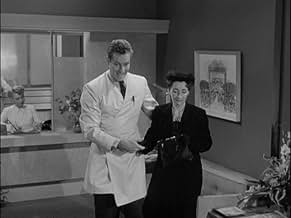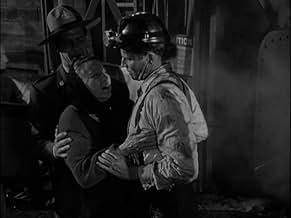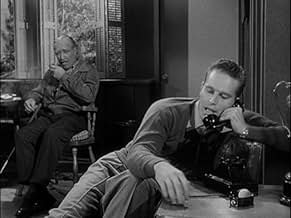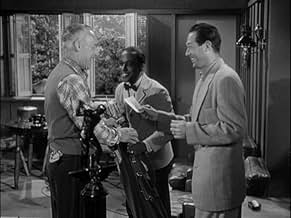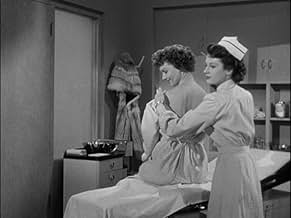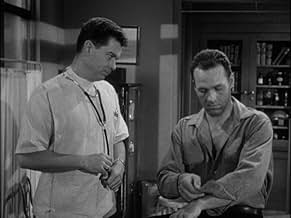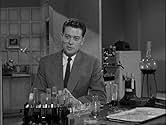NOTE IMDb
5,8/10
1,1 k
MA NOTE
Ajouter une intrigue dans votre langueA doctor returning from the Korean War to his hometown in Pennsylvania must choose what next to do with his life.A doctor returning from the Korean War to his hometown in Pennsylvania must choose what next to do with his life.A doctor returning from the Korean War to his hometown in Pennsylvania must choose what next to do with his life.
- Réalisation
- Scénario
- Casting principal
Philip Ahlm
- Minor Role
- (non crédité)
Elsie Baker
- Mrs. Olzoneski
- (non crédité)
Mary Benoit
- Party Guest
- (non crédité)
Avis à la une
Army surgeon Charlton Heston is happy with his work, but a visit home to the coal-mining town he was born in,as well as society vamp Lizabeth Scott, make him think there's more to life than patching up wounded soldiers. At first he's interested in serving the poor people he grew up with. However Miss Scott gets him a job with society doctor Lester Matthews and becomes engaged to him. He finds his practice consists largely of giving nostrums to wealthy women at $250 a visit. Finally his nurse, Dianne Foster, leaves him to assist Dr. Arthur Franz, who's taking care of the miners and their families. His crisis of faith, however, is yet to come.
Heston has already developed his deep-throated growl in this movie, although he has not perfected it. It has a quality to it that I think is supposed to denote dissatisfaction, but sounds whiny to me. In a world where everyone else struggles for status and wealth, it's up to the woman at the top of both trees to point out the necessity of honesty and honor; well, she's the only one who can.
Heston has already developed his deep-throated growl in this movie, although he has not perfected it. It has a quality to it that I think is supposed to denote dissatisfaction, but sounds whiny to me. In a world where everyone else struggles for status and wealth, it's up to the woman at the top of both trees to point out the necessity of honesty and honor; well, she's the only one who can.
(1953) Bad For Each Other
DRAMA
Co-written and directed by Irving Rapper that opens with a colonel, Thomas Owen (Charlton Heston) or Tom for short coming back to a mining town, Coalville and finds out his brother had long been past, that he may not be on the up and up as told by mother, Mrs. Mary Owen (Mildred Dunnock). So he then goes and visits the owner of the coal mine, Dan Reasonover (Ray Collins) and finds out that he stole and owed money to the coal mining comp as well as the owner Reasonover. During this, Dan Reasonover's daughter, Helen Curtis then becomes infatuated by him and tries to convince him to become a doctor for the upper class as a profession and drop from being one for the army. He does, and at the same time falls for Helen and let's her to drop what he wanted to do to become an associate for Dr. Homer Gleeson (Lester Matthews). And while he is in love with Helen, both Tom's own mother as well as Helen's dad disapproves of the match once he proposes to her.
The dilemma unfolds when Tom decides to break ethic rules by letting his boss Dr. Homer Gleeson to take full credit for a surgery he had done, forcing the nurse he had recently hired and respects to move to quit working for him and work for a much smaller clinic for the workers of Coalville.
It is kind of odd, this movie was selected to be shown on TCM Eddie Muller's Noir Alley when the overall experience is more drama than noir. And upon listening to Eddie Muller both from the introduction and afterward, I do not recall, why he thought this was film noir as their was no murder involve at all, but just some dilemmas.
Co-written and directed by Irving Rapper that opens with a colonel, Thomas Owen (Charlton Heston) or Tom for short coming back to a mining town, Coalville and finds out his brother had long been past, that he may not be on the up and up as told by mother, Mrs. Mary Owen (Mildred Dunnock). So he then goes and visits the owner of the coal mine, Dan Reasonover (Ray Collins) and finds out that he stole and owed money to the coal mining comp as well as the owner Reasonover. During this, Dan Reasonover's daughter, Helen Curtis then becomes infatuated by him and tries to convince him to become a doctor for the upper class as a profession and drop from being one for the army. He does, and at the same time falls for Helen and let's her to drop what he wanted to do to become an associate for Dr. Homer Gleeson (Lester Matthews). And while he is in love with Helen, both Tom's own mother as well as Helen's dad disapproves of the match once he proposes to her.
The dilemma unfolds when Tom decides to break ethic rules by letting his boss Dr. Homer Gleeson to take full credit for a surgery he had done, forcing the nurse he had recently hired and respects to move to quit working for him and work for a much smaller clinic for the workers of Coalville.
It is kind of odd, this movie was selected to be shown on TCM Eddie Muller's Noir Alley when the overall experience is more drama than noir. And upon listening to Eddie Muller both from the introduction and afterward, I do not recall, why he thought this was film noir as their was no murder involve at all, but just some dilemmas.
A freshly discharged army doctor passes up practice in blue-collar hometown for big- paying practice among a city elite that includes a cool blonde dilettante.
I got this epic as part of a package claiming to be all noir. The only thing noir in this movie are the several night time shots— otherwise, no crime, no hand of fate, and no moody atmosphere. Only blonde seductress Helen (Scott) instead, and she's hardly the standard spider woman. Actually, the movie's more b&w soap opera than anything else.
That's not to say there're no redeeming features. I guess I wasn't aware of what a racket doctoring among the wealthy can be. The movie shows what a cushy pandering job it can be, treating headaches with high-priced medicines and smarmy words. And coming from a muckraker like novelist McCoy, e.g. They Shoot Horses Don't They (1969), I take it as factually based.
And surprise, surprise, to me, at least—actor Heston is quite animated as the sell-out doctor. I guess this was before he stiffened into a big-screen movie god, but whatever, he's quite persuasive in the role. Still, I thought the script made the doc's transition from honorable soldier to money-grubbing pill pusher much too easy, more like a movie device than a character change. Nonetheless, get a load of the coal mine scenes, quite realistic and well done.
But, bottom line, the story follows a familiar pattern with no surprises, suggesting a production serving mainly as a vehicle for Columbia's newest hunk.
I got this epic as part of a package claiming to be all noir. The only thing noir in this movie are the several night time shots— otherwise, no crime, no hand of fate, and no moody atmosphere. Only blonde seductress Helen (Scott) instead, and she's hardly the standard spider woman. Actually, the movie's more b&w soap opera than anything else.
That's not to say there're no redeeming features. I guess I wasn't aware of what a racket doctoring among the wealthy can be. The movie shows what a cushy pandering job it can be, treating headaches with high-priced medicines and smarmy words. And coming from a muckraker like novelist McCoy, e.g. They Shoot Horses Don't They (1969), I take it as factually based.
And surprise, surprise, to me, at least—actor Heston is quite animated as the sell-out doctor. I guess this was before he stiffened into a big-screen movie god, but whatever, he's quite persuasive in the role. Still, I thought the script made the doc's transition from honorable soldier to money-grubbing pill pusher much too easy, more like a movie device than a character change. Nonetheless, get a load of the coal mine scenes, quite realistic and well done.
But, bottom line, the story follows a familiar pattern with no surprises, suggesting a production serving mainly as a vehicle for Columbia's newest hunk.
Charlton Heston and Lizabeth Scott are "Bad for Each Other" in this predictable 1953 film, also starring Mildred Dunnock, Arthur Franz, Marjorie Rambeau, and Dianne Foster.
Heston plays a doctor who returns from the service to the coal town where he grew up. After meeting the wealthy, twice-married, shallow Scott, he decides not to stay in the service and becomes a society doctor, in it for the money. The nurse he hires to work for him (Foster) thinks he's better than that.
The role played by Arthur Franz, that of a young doctor who admires him and doesn't mind going into the trenches, is essentially Heston's conscience.
I found this film pretty bland, but the big problem for me was that the main character as portrayed by Heston was just not likable. He wasn't likable before he took up with Scott nor was he likable throughout the film. Some of this was in the script, but some of it was in his line readings. He had fat attitude every time he opened his mouth. Frankly I didn't care what he did.
Lizabeth Scott was best earlier in her career, in her noir days, where her great voice, sexy blond looks, and ambiguous performances fit very well. Her character in this also was annoying. Now, she's not supposed to be likable, but we should have been able to see why Heston liked her. She seemed awfully pushy for his character to have put up with her.
Heston was tall, handsome, with a great voice and a dominating presence. This film was unfortunately directed in a somewhat old-fashioned manner so as to seem melodramatic and over the top. When someone with that strong a screen persona is directed that way, his performance becomes too actor-y.
Nothing special.
Heston plays a doctor who returns from the service to the coal town where he grew up. After meeting the wealthy, twice-married, shallow Scott, he decides not to stay in the service and becomes a society doctor, in it for the money. The nurse he hires to work for him (Foster) thinks he's better than that.
The role played by Arthur Franz, that of a young doctor who admires him and doesn't mind going into the trenches, is essentially Heston's conscience.
I found this film pretty bland, but the big problem for me was that the main character as portrayed by Heston was just not likable. He wasn't likable before he took up with Scott nor was he likable throughout the film. Some of this was in the script, but some of it was in his line readings. He had fat attitude every time he opened his mouth. Frankly I didn't care what he did.
Lizabeth Scott was best earlier in her career, in her noir days, where her great voice, sexy blond looks, and ambiguous performances fit very well. Her character in this also was annoying. Now, she's not supposed to be likable, but we should have been able to see why Heston liked her. She seemed awfully pushy for his character to have put up with her.
Heston was tall, handsome, with a great voice and a dominating presence. This film was unfortunately directed in a somewhat old-fashioned manner so as to seem melodramatic and over the top. When someone with that strong a screen persona is directed that way, his performance becomes too actor-y.
Nothing special.
Charlton Heston stars as doctor and retired Army colonel Tom Owen. He has returned to his home turf, the small mining town of Coalville. The miners hate him because of something his now-dead brother did years earlier, but the upper crust of Coalville society are excited by the new hunky doctor's arrival. With the help of rich man-eater Helen (Lizabeth Scott), Tom is soon in private practice, catering to the lonely and wealthy women of Coalville. His nurse Joan (Dianne Foster) wants to practice the "right kind of medicine", but is Tom only interested in a fast buck and a good time?
This was just terrible, badly written and even more poorly acted. Heston wins the prize for "Worst in Show", delivering his lines in the most grating, hammy way imaginable, while also exhibiting some of the most overwrought physical business I've ever seen on the screen. The script never fails to tell you how wonderful Heston's Tom Mason is supposed to be, even if we are given scant evidence of it. Every woman falls at his feet, while every man is either in awe or angry with jealousy. Some may enjoy how the movie moves from just bad to amusingly camp, while others will just hit the "stop" button and find something better to do with their remaining time.
This was just terrible, badly written and even more poorly acted. Heston wins the prize for "Worst in Show", delivering his lines in the most grating, hammy way imaginable, while also exhibiting some of the most overwrought physical business I've ever seen on the screen. The script never fails to tell you how wonderful Heston's Tom Mason is supposed to be, even if we are given scant evidence of it. Every woman falls at his feet, while every man is either in awe or angry with jealousy. Some may enjoy how the movie moves from just bad to amusingly camp, while others will just hit the "stop" button and find something better to do with their remaining time.
Le saviez-vous
- AnecdotesAccording to December 1950 articles in The Hollywood Reporter and the Los Angeles Times, producer Hal B. Wallis purchased the rights to the novel before it was published for $100,000 ($1.3M in 2024). Wallis intended the leads to be Burt Lancaster and Patricia Neal and that the project was to be filmed at Paramount. It never got off the ground, and Wallis ended up selling the rights to Columbia in early 1953.
- GaffesThe beginning scenes of movie show coal mine operations in Coalville, PA. The railroad caboose was from ATSF (Atchison, Topeka, and Santa Fe). That railroad never had operations in Pennsylvania.
- Citations
Dr. Tom Owen: [on the phone with his wife] Oh, I'm interviewing nurses, of course... Don't be silly, darling - of course she'll be fat and ugly. I do insist on good legs, though.
Meilleurs choix
Connectez-vous pour évaluer et suivre la liste de favoris afin de recevoir des recommandations personnalisées
- How long is Bad for Each Other?Alimenté par Alexa
Détails
- Durée
- 1h 23min(83 min)
- Couleur
Contribuer à cette page
Suggérer une modification ou ajouter du contenu manquant

